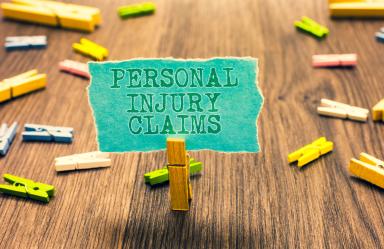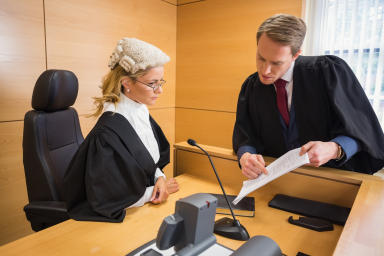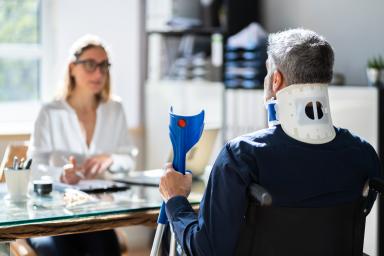Nevada Personal Injury Laws

Nevada bustles with life. Also known as the Silver State, it has always had something for both locals and tourists, from the gorgeous desert landscapes and mountain vistas to its lively casinos and colorful nightlife features, especially in Las Vegas. Nonetheless, the state is no stranger to injuries and accidents, which unfortunately occur daily. They do not only impact how a person acts but also affect his or her family, livelihood, property, and way of life. Based on studies by the Centers for Disease Control and Prevention, accidents are the fourth leading cause of death in Nevada. Clark County, home of Las Vegas, usually reports the highest instances of crashes and fatalities in the state.
If you are harmed following an accident, you can file an injury claim or lawsuit. Personal injury is a branch of the law that deals with injuries or deaths caused by the negligence of another party. Some common examples of areas covered under personal injury are car accidents, product and premises liability, and medical malpractice.
This article discusses various types of personal injury cases, the statute of limitations for filing a claim, and the amount one can recover in a lawsuit. It also lists legal resources that can assist victims in pursuing compensation to recover from their damages and losses.
Auto Accident Laws in Nevada
According to data from the National Highway Traffic Safety Administration, fatal collisions and traffic-related fatalities in Nevada have greatly increased over the last decade. In 2022 alone, 382 people were killed on the state's roads. Meanwhile, 71% of fatal crashes occurred on urban roads from 2016 to 2020. Impaired driving, speeding-related crashes, sudden lane departures, and intersection collisions are some of the most common causes of traffic accidents and fatalities.
If you were injured in a car accident, Nevada's laws require the one at fault to provide compensation for damages. You can also submit a claim against the other party's insurance company, as drivers are required to have liability insurance worth the following:
$25,000 for bodily injury or death of one person in a crash.
$50,000 for bodily injury or death of two or more people in a crash.
$20,000 for property damage in a single collision.
Nevada Uses Comparative Negligence to Determine Who Is at Fault
Regarding how much one might recover for damages in auto accident cases (and other types of personal injury claims), Nevada uses the comparative negligence rule. This means your compensation may be decreased based on the percentage of your culpability. Under Nevada law, you cannot recover anything if your share of negligence is greater than the other party's.
For example, the court finds that the cost of the damages you received in a vehicle accident is $50,000, but you were 20% at fault. The available sum is then lowered by 20%, bringing the total to $40,000. If you are more to blame than the other party or parties involved in the accident, you are not eligible to receive any compensation.
Medical Malpractice Laws in Nevada
Medical malpractice is defined as the failure of healthcare practitioners to provide appropriate care, resulting in patient injury or death. Nurses, dentists, physicians, and other medical professionals are some examples of these practitioners. Excluded are those not listed under the state statute, which are mainly individuals who offer wellness services such as aromatherapy, herbology, and energetic healing.
To start with your claim, you must submit a complaint. In order to bring a valid professional negligence lawsuit, the plaintiff must have an affidavit stating that the physician's specific inaction or negligent act caused harm. The documents must fulfill the following criteria:
It must be provided by a qualified medical expert who practices or has previously worked in an area of practice related to the claimed professional negligence;
It must back up the accusations made in the action;
It should identify the name or characterize the provider accused of negligence; and
It must list in "simple, concise, and direct terms" the specific act or acts of professional negligence performed by each provider being sued separately.
It is vital to note that a claim is not feasible if the healthcare professional's error did not result in injuries to the victim.
Workers' Compensation Laws in Nevada
In 2021, Nevada was one of the 19 states that had a significantly higher rate of total recordable cases of workplace injuries and illnesses. It was at 3.3 per 100 full-time equivalent employees, higher than the national rate of 2.7, according to the U.S. Bureau of Labor Statistics. In the private industry alone, there were 27,200 injury cases and 2,600 instances of workplace illness recorded. Other sectors that reported high figures include education, health, transportation, and local government.
Employers across the state are required by law to have workers' compensation insurance for employees in case they sustain injuries or sickness in the workplace. Coverage includes lost wages, rehabilitation, and other medical expenses. If the injury impacts the employee's ability to work, there are also various types of disability benefits depending on the circumstances, such as:
Temporary Total Disability (TTD) is granted to employees who have been gravely injured or have had physical limitations that make them unable to work temporarily.
Temporary Partial Disability (TPD) is money paid for wounded workers who return to work but earn less than they did before the injury.
Permanent Total Disability (PTD) is payment granted for employees who are unable to work permanently owing to work-related accidents. This will be paid for for the rest of their lives.
Permanent Partial Disability (PPD) is typically a lump sum paid to workers who have sustained a permanent handicap as a result of workplace injuries.
To obtain workers' compensation, you must first file a completed Notice of Injury or Occupational Disease (Form C-1) within one week after the accident or diagnosis of the occupational sickness. In addition, you must have a Wage Verification Form (D-8 Form) and a Report of Industrial Injury or Occupational Disease (C-3 Form), all of which must be completed within six working days by your employer and your company's insurance carrier. Furthermore, within three working days of treatment, you, your employer, your employer's insurance provider, and your treating physician must submit a Claim for Compensation/Report of Initial Treatment (C-4 Form). The insurance company must then accept the claim within 30 days of the notification.
Product Liability Laws in Nevada
Product liability, according to Nevada's revised statutes, refers to the liability for damages for any personal injury or death caused by the manufacturing, design, labeling, packaging, or sale of a product. In the state, there are four common legal theories that consumers can use to file a product liability claim:
Negligence - In this context, negligence means there was no reasonable care used in the manufacturing and design of a product.
Breach of warranty - Plaintiffs may sue the manufacturer for this kind of breach when the product fails to perform as stated or promised or fails to fulfill the plaintiff's expectations.
Strict liability - Under this theory, the consumer must prove that the product itself contains flaws that have resulted in injury.
Misrepresentation - This term is commonly used in cases involving information that misrepresents material facts about a product, such as exaggerated advertising claims and deceptive labeling.
Moreover, plaintiffs can file legal action not only against the manufacturer but also against wholesalers, retailers, and distributors who were involved in the sale of the defective product.
Premises Liability Laws in Nevada
A premises liability claim is filed if the victim was injured on another person's property and they want the property owner to be held responsible for the damages. Some of the parties that can be held liable are landlords, private homeowners, business owners, tenants who caused damage to the property, and management companies. There are various types of premises liability, such as slips and falls, dog bites, and swimming pool accidents.
The jury establishes the reason the plaintiff went to the property and the level of care that applies in a premises liability case. There are varying levels of care that property owners must carry out to protect their visitors.
They have the highest duty to invitees, who are invited into the premises for the benefit of the owner. To protect them, they must actively seek out and address any potential hazards or dangers.
Next are the licensees, or individuals who are invited for mutual benefit. It is the responsibility of property owners to alert guests about potential hazards or to repair them. However, they are not required to actively inspect their property.
Finally, there are the trespassers, who are not invited to be on the premises. While property owners, occupants, and lessees typically owe no duty of care to trespassers and are not liable for their injuries while on the premises, there are still situations where they may be subjected to liability. If the property has structures or items that may attract children, the owner may be held liable if a child gets injured. This is known as “attractive nuisance.” According to a portion of Nevada's updated statutes, the following factors must be present to hold the property owner liable:
The owner knows or has reason to believe that a kid will trespass on his or her property.
The owner is aware that the state of his or her property is dangerous to children.
Due to their youth, the trespassing child is unaware of the risk associated with entering the property.
The effort and money that would’ve been spent on keeping the property safe are insignificant when compared to the injuries a child could experience if they were injured.
The owner has failed to take reasonable precautions to remove the hazard or safeguard the child from harm.
How Much Can Someone Sue for an Injury in Nevada?
There are two types of compensatory damages plaintiffs can claim in a personal injury case: economic and non-economic damages. Economic damages, also called special or pecuniary damages, are costs for anticipated and future fixed expenses. Medical bills, lost wages, and loss of earning capacity are some examples. There are no caps on economic damages.
Meanwhile, non-economic damages are those that are difficult to give an exact monetary value to. Compensation for pain and suffering, physical impairment, deformity, and other non-financial damages are among them. While there are usually no recoverable limits for non-economic damages, for medical malpractice lawsuits, Nevada implements a damage cap of $350,000.
There is also a limit on how much you can claim for punitive damages. These damages, separate from compensatory damages, are given as a way to punish the defendant after proving their intentional negligence toward the plaintiff. The cap for this type of reward is dependent on the compensatory damages that are going to be awarded:
If the compensatory damages are more than $100,000, the punitive damages shall not exceed three times the compensatory damages.
If the compensatory damages are less than $100,000, the cap is $300,000.
However, the damage caps for punitive damages do not apply if the action was launched against certain defendants. These include manufacturers of defective products, insurers that behaved in bad faith in providing insurance coverage, persons who committed defamation, and those who violated a state or federal law against discriminatory housing practices. In addition, the recovery limitations are not applicable if the injury was caused by the emission, disposal, or spilling of hazardous, radioactive, or toxic waste.
For tort claims against the state, the cap for recovering damages is at $200,000.
The Statute of Limitations in Nevada
According to the Limitations of Actions chapter of the Nevada legislation, a personal injury plaintiff generally has two years from the date of the defendant's negligence to file a claim. This also applies to wrongful death claims, which begin on the date of the victim's death. For property damage claims, the time limit is three years.
There is also a section of the statutes dedicated to minors who have suffered injuries from sexual abuse or exploitation. They can begin pursuing damages against the accused perpetrator at any time after the sexual exploitation or abuse occurred. The statute of limitations for this form of claim then becomes 20 years after the plaintiff turns 18.
Meanwhile, the statute of limitations for medical malpractice claims is one year after the plaintiff discovers the injury or three years after the date of the injury, whichever comes first. There are, nevertheless, some exceptions, particularly in circumstances involving children:
The statute of limitations is extended until the kid is 10 years old if the accident involves birth defects or brain injury.
If the harm causes sterility to the child, one may launch a lawsuit within two years of discovering the injury.
Moreover, for personal injury claims against a government entity, additional steps must be taken. The plaintiff must submit a written and signed statement to the Nevada State Board of Examiners within a two-year timeframe following the discovery of the injury.
Legal Resources for Injured Folks in Nevada
Nevada Attorney for Injured Workers
The Nevada Attorney for Injured Workers is a state agency that provides free legal assistance to employees who have been injured or become ill on the job. Its lawyers represent plaintiffs at the administrative appeal level before the Appeals Officer. They also help Nevadans understand various topics under workers' compensation, such as obligations and rights under industrial insurance plans and healthcare policies, benefits, claims, and appeals. Furthermore, on its website, NAIW provides additional materials and essential paperwork relating to workers' compensation claims.
The State Bar of Nevada's Lawyer Referral Service
The State Bar of Nevada's Lawyer Referral Service focuses on aiding citizens with their legal issues by offering referrals. It has around 300 attorneys working on the service, which covers 22 main law areas and 170 subcategories, including personal injury and workers' compensation. It works by analyzing your legal needs and then providing the name and phone number of an attorney who practices in the related law field so that you may schedule a consultation. If the consultation is unsuccessful, you may contact the LRS for additional recommendations. For further information, call 702-382-0504 or 1-800-789-5747 (toll-free).
Nevada Legal Services's Senior Law Project
The Senior Law Project offers legal services to individuals 60 years of age and older. It is a department of Nevada Legal Services, Inc., a statewide, nonprofit, and public interest law firm focused on providing legal counsel for residents throughout the state. This project tackles a variety of cases involving government benefits and entitlements, such as reductions, denials, and overpayments for plaintiffs in personal injury cases, including medical malpractice. Plaintiffs can learn more by going to the nearest Nevada Legal Services Office or by visiting the NLS website.
Expertise.com StaffAuthor
Step into the world of Expertise.com, your go-to hub for credible insights. We don't take accuracy lightly around here. Our squad of expert reviewers, each a maestro in their field, has given the green light to every single article you'll find. From rigorous fact-checking to meticulous evaluations of service providers, we've got it all covered. So feel free to dive in and explore. The information you'll uncover has been stamped with the seal of approval by our top-notch experts.




